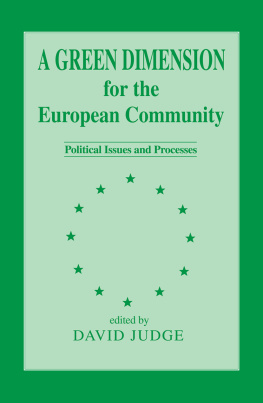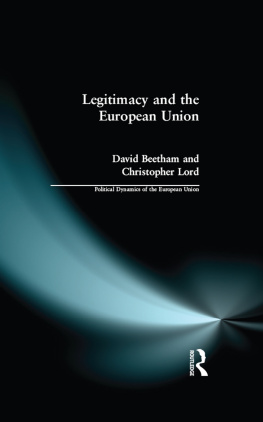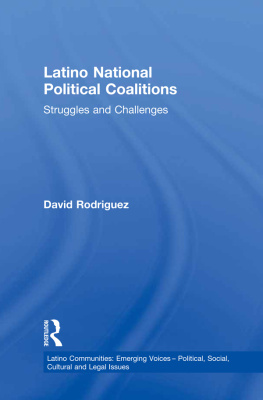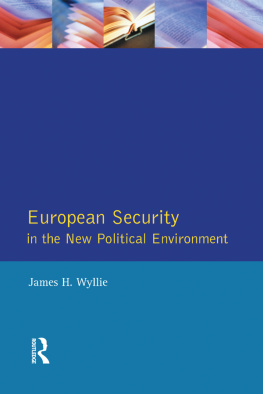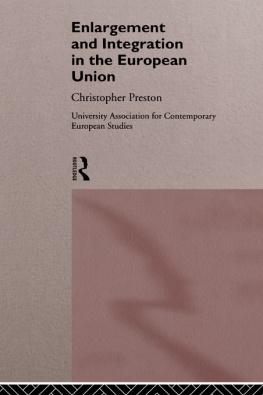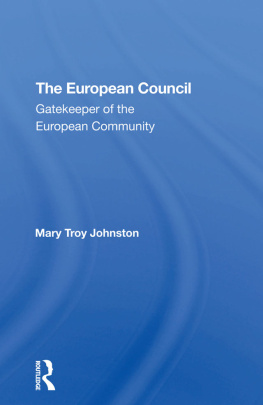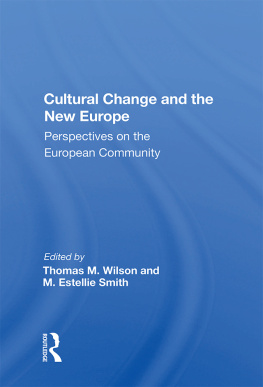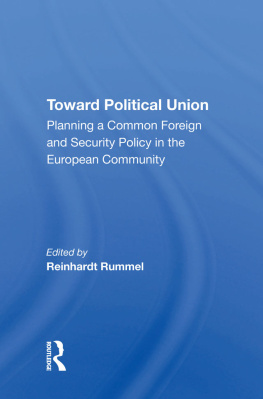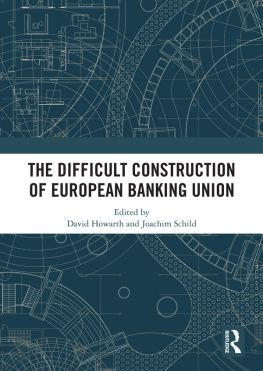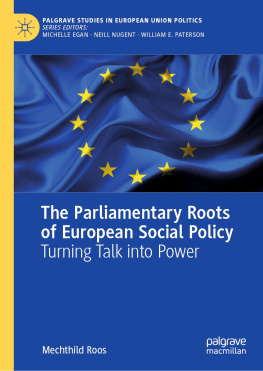First published 1993 by
FRANK CASS AND COMPANY LIMITED
Published 2013 by Routledge
2 Park Square, Milton Park, Abingdon, Oxon OX14 4RN
711 Third Avenue, New York, NY, 10017, USA
Routledge is an imprint of the Taylor & Francis Group, an informa business
Copyright 1993 Frank Cass & Co. Ltd
British Library Cataloging in Publication data
Green Dimension for the European Community:Political Issues and Processes.
- (Special Issue of Environmental Politics Series, ISSN 0964-4016;Vol.l, No. 4)
I. Judge, David II. Series
333.7094
Library of Congress Cataloging-in-Publication Data
A Green dimension for the European community : political issues and processes / edited by David Judge.
p. cm.
Includes bibliographical references and index.
1. Environmental policyEuropean Economic Community countries. 2. Green movementEuropean Economic Community countries. I. Judge, David.
HC240.9.E5G73 1993
| 363.7056094dc20 | 92-21174 |
| CIP |
ISBN 13: 978-0-714-64510-0 (hbk)
ISBN 13: 978-0-714-64096-9 (pbk)
This group of studies first appeared in a Special Issue: A Green Dimension for the European Community: Political Issues and Processes, of Environmental Politics, Vol. 1, No. 4, published by Frank Cass & Co. Ltd.
All rights reserved. No part of this publication may be reproduced, stored in a retrieval system, or transmitted in any form, or by any means, electronic, mechanical, photocopying, recording, or otherwise, without the prior permission of the publisher.
Typeset by Regent Typesetting, London
DAVID JUDGE
The introduction of the Single Market marks a particularly appropriate time to consider the political issues and processes affecting environmental policy in the European Community (EC). In Britain the 1992 project designated 31 December 1992 as the date for the completion of the single market: for the removal of physical, technical and fiscal barriers to the free movement of goods, services, capital and people within the EC. The French on the other hand, whilst talking of the same thing, see the 1993 programme as marking the start of the single market. Irrespective of whether the single market was completed in 1992 or starts in 1993 its impact on environmental policy within member states will be considerable. As the European Commission states:
Under the Single Act, the EC has taken on the task of preserving and protecting a sound environment and improving its quality, safeguarding human health, and ensuring the prudent and rational use of natural resources. It intervenes where these objectives can be better achieved at Community level than by Member States acting individually. The basic principle is to prevent and remedy environmental damage [EC Commission, 1991: 17].
This statement in itself is sufficient justification for a volume concerned with the politics of environmental policy-making within the EC, for it raises fundamental questions. What is sound environmental policy? What forms of intervention serve to preserve and protect a sound environment? At what level is a sound environmental policy to be formulated and implemented? And who decides what constitutes prudent and rational policy? These questions go to the heart both of studies concerned with policy making in the EC and of those concerned with the substantive policy area of the environment itself.
A second justification for this volume, however, is that environmental politics and the politics of the European Community, until fairly recently, have been Cinderella subjects in the United Kingdom. Significantly, in recent years, both have been transformed from being the preserve of small but dedicated groups of scholars and teachers into the status of mainstream university courses and research areas [Rdig, 1990: 3; Weale, 1991: 198; George, 1991: x]. None the less, as emergent subjects, they have tended, perhaps not surprisingly, to develop discretely with few systematic connections made between the politics of the EC and environmental policy. One notable exception to this tendency is provided by the Institute for European Environmental Policy which has long recognised the interconnectedness of the nature of environment policy with the system that exists to develop and implement EC policies [Haigh and Baldock, 1989: 47; also Haigh, 1991; Wilkinson, 1992]. This exceptional concern with the interconnectedness of environmental policy and EC political processes provides the directional pointers for the present volume.
Why EC Environmental Policy?
The 1957 Treaty of Rome, the founding treaty of the European Economic Community, made no reference to the environment and had no conception of environmental policy as an integral part of a common market. Some 35 years later, however, environmental policy is indisputably a major part of the ECs activities; and moreover, in the opinion of two respected commentators, is not only a major Community policy, but also an undeniable success, despite certain gaps and weaknesses [Johnson and Corcelle, 1989: 2].
So the first, related, questions to ask are: why, and how, has the EC developed a major environmental policy role? The answer to the first question is often treated as self-evident: because of an increased recognition of the political salience and the international dimension of environmental problems. Pinder [1991: 111] implicitly accepts this logic in his statement that: Pollution carried by air or water does not recognise frontiers, so member states have a common interest in its mutual control. As ecological deterioration has become aggravated and public concern correspondingly sharpened, this aspect of Community activity (environmental policy) has become increasingly important. But, as Philipp Hildebrands contribution to the present volume demonstrates, the reasons for the development of EC environmental policy were far more complicated than a spontaneous recognition of common interest by member governments. Indeed, in the period before 1972 the driving force behind environmental protection in western Europe was a few environmentally conscious national governments (most particularly Holland and West Germany) rather than the EC itself. In part, this was because of the absence of legal competence for EC institutions in this area, with legal opinion divided over whether the EC had any competence in environmental matters [Lodge, 1989: 320]; but also, in part, because many member governments conceived of environmental protection primarily in relation to intra-Community non-tariff barriers. In this sense, as McGrory [1990: 304] points out, until 1973, Community environmental policy was incidental to measures to harmonise laws in order to abolish obstacles to trade between the Member States.
What transformed environmental policy from an incidental to an essential part of the ECs policy programme, starting in the 1970s, was a heightened awareness of the environmental consequences of unregulated economic growth; the trade distortions attendant upon uncoordinated pollution standards; two environmental disasters in EC states in 1974 at Flixborough in the UK and in 1976 in Seveso in Italy; and increased public sensitivity to environmental issues (see Hildebrand in this volume). Once the Communitys heads of state and government acknowledged in 1972 that economic expansion is not an end in itself it should result in an improvement in the quality of life as well as the standard of living (quoted in COM (92) 23 final, Vol.2, 27 March 1992, p. 17), and asked the Commission to draw up an Action Programme for the Environment, then the legitimacy of the EC as a coordinator and harmoniser of environmental programmes rapidly became political, if not legal, reality. Legal recognition was to come later in 1987 with the Single European Act (SEA), and its belated recognition and symbolisation of what had been happening anyway [


